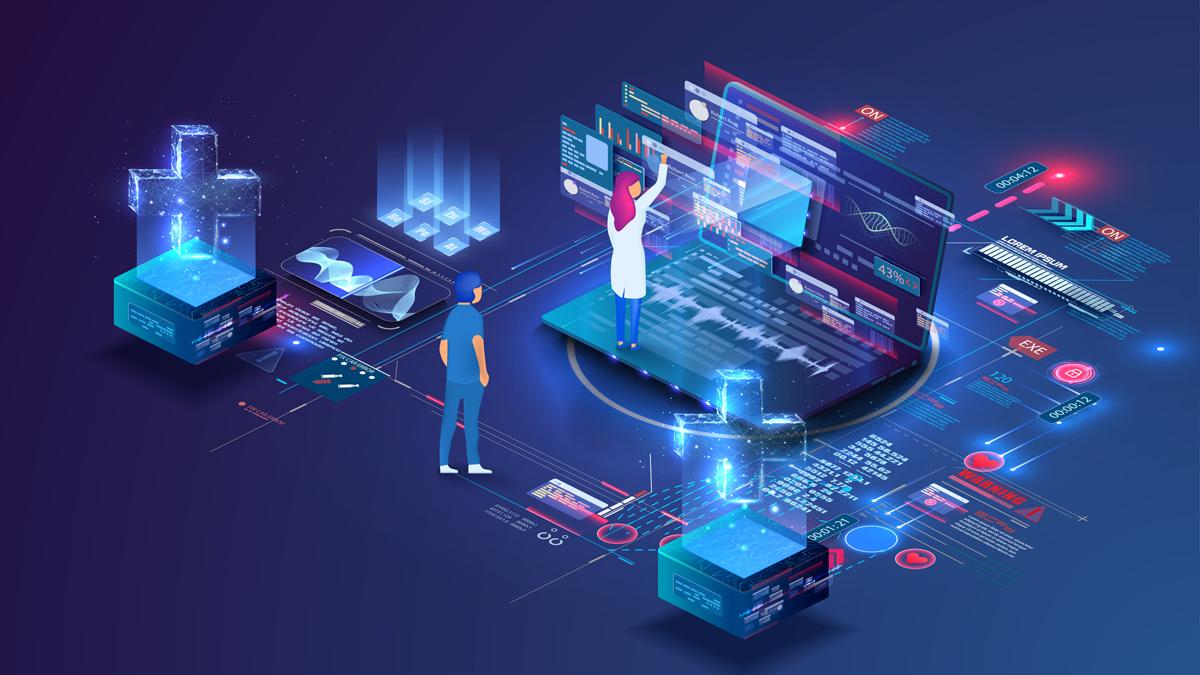AI and new technologies: How the pharmaceutical industry is reinventing itself to meet ever more urgent needs

The world is changing rapidly, and the healthcare sector is no exception. With an ageing population on the rise in many countries, and its corollary of often urgent healthcare needs, the key players in healthcare must now rise to this major challenge by massively adopting artificial intelligence to meet more ambitious requirements in terms of availability, delivery, and ease of access to innovative treatments, worldwide.
The new face of the pharmaceutical industry
Artificial intelligence (AI) is an increasingly valuable tool in our perpetual quest for the miracles that science regularly offers. Set to revolutionise the biopharmaceutical sector in the next few years, AI is already generating unprecedented changes in critical areas of the industry - R&D, clinical trials, production, and quality control.
For major discoveries and the resulting treatments to truly transform patients' lives, however, production and logistics capabilities need to be up to speed. The potential of AI as an accelerator has been recognised for some time, and unleashing this technological power has been one of our key challenges over the last four or five years.
Today, we are relying on digital technologies to innovate in the supply of medicines, while maintaining the most rigorous quality standards. In our sector, the use of AI and data-driven tools is helping to speed up process efficiency and reduce production times.
One of the most tangible results is the use of digital twins. For instance, in Waterford, Ireland, where we worked with Digital Manufacturing Ireland (DMI), a national body and joint initiative of the Irish government and IDA Ireland, digital twins enabled us to create a ‘virtual line’ or ‘virtual process’. This gave us the freedom to zoom out to see the bigger picture, and at the same time test what-if scenarios and solutions to any problems that might be encountered along the way, without having to interrupt the production process and without any downtime.
Thanks to the power of digital technologies, new benchmarks can be set in terms of product launches, process optimisation, and equipment management, resulting in an acceleration of the ability to deliver life-prolonging medicines to patients around the world.
The scope for innovation is vast. We are now seeing AI-driven systems, such as cameras, being used in a virtual environment to enable more advanced inspections and automatic reporting. GenAI's documentation tools, which automatically generate content for regulatory and quality reports, will reduce lead times by up to 60% by the end of 2024, and by up to 75-85% by the end of 2025.
The innovation we're talking about isn't just about speed, though. It's also about consistency and reliability, while significantly reducing overall costs. But we shouldn't be blind to the fact that AI presents a real challenge in terms of responsibility, and humans must remain in the loop, taking responsibility for the results obtained with a system based on artificial intelligence.
A new paradigm for developing talent
The pharmaceutical industry's use of AI to revolutionise the healthcare sector brings with it a new paradigm for developing talent, which involves working closely with local ecosystems, such as universities and R&D centres. This joint work is encouraging a younger generation to enter the sector who are keen on technology and highly skilled in digital, data analysis, and statistical elements.
To address the skills gap in certain areas, one approach is to provide employees with a wide range of resources to enhance their skills, including enabling engineers to acquire new digital capabilities on the job, without having to go back to university. Ireland's vibrant med-tech ecosystem, supported by a wide range of science and technology parks and a skilled workforce, is one example of an environment suited for such digital evolution.
Skills development remains a universal challenge, however, and this is as true in France as it is in Waterford. This is why forging strategic alliances with university institutes and various training programmes (apprenticeship and skills enhancement programmes) is necessary, to ensure a continuous pipeline of appropriately trained talent in the various key professions and digital technologies.
Healthcare companies need to actively engage in developing a pipeline of future leaders with appropriate knowledge of data science, AI, and virtual reality systems. In order to develop talent and attract new graduates to the sector, the challenges that lie ahead need to be met and the journey of knowledge acquisition must continue, appropriately supporting and evolving alongside this new talent.
By embracing this new paradigm wholeheartedly, our ecosystem will be able to cultivate a digitally literate workforce capable of creating the foundations of the future healthcare sector through innovation.
With this in mind, the sector will undoubtedly face significant challenges even as we accelerate our capabilities with AI and other innovative technologies to address the most pressing healthcare needs for patients around the world. Just as the COVID pandemic highlighted vulnerabilities in the supply chain, forcing the streamlining of processes and avoiding roundabouts, one of the key challenges today is how best to standardise processes across the world, striving for real commonality despite regional differences.
A responsible approach to the future is essentially focused on patient safety, upholding the highest standards of integrity and compliance, and maintaining transparency. To achieve this, working closely with partners, industry leaders, and the wider ecosystem is vital to ensure that the biopharmaceutical industry can continue to deliver the highest quality care and most innovative treatments to patients around the world.












